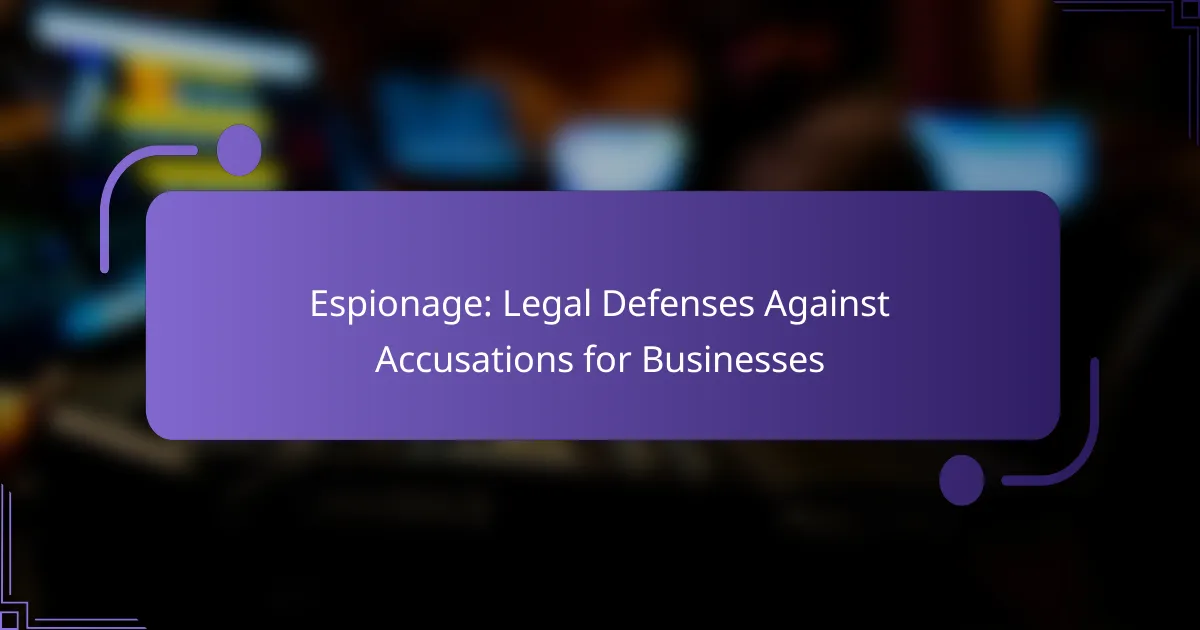In the United States, businesses facing espionage accusations have several legal defenses at their disposal, including affirmative defenses and constitutional protections. By implementing strong compliance programs and training employees on security protocols, organizations can better prepare for potential allegations. Legal counsel is essential in these cases, offering guidance on rights and strategies to effectively navigate the complexities of espionage charges.
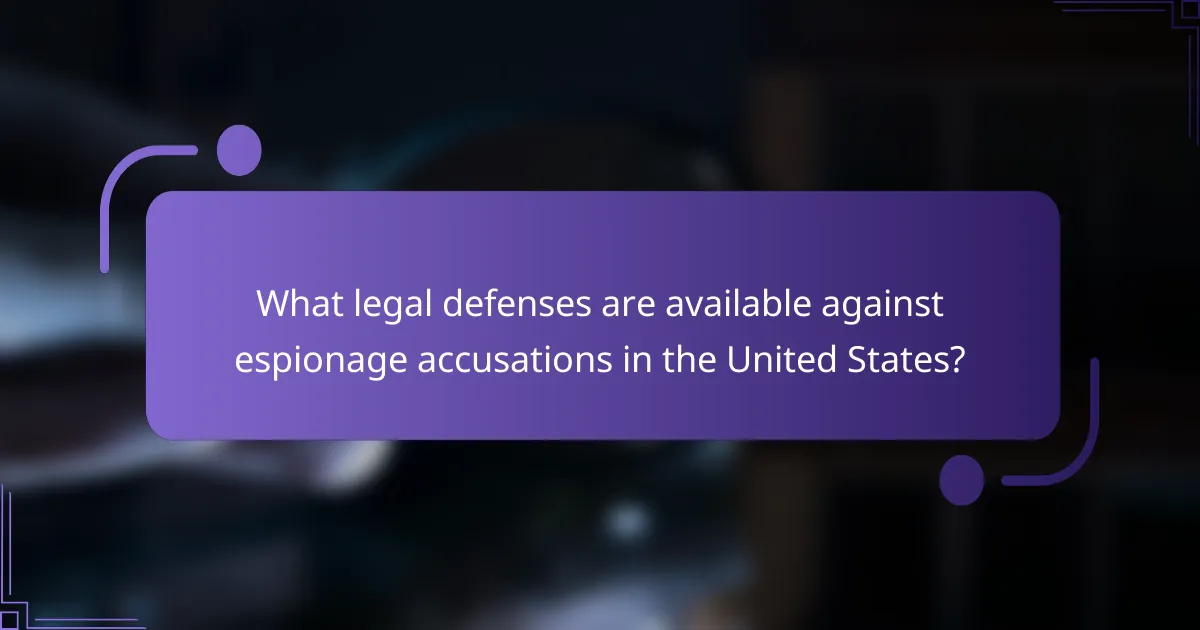
What legal defenses are available against espionage accusations in the United States?
In the United States, businesses accused of espionage can utilize several legal defenses to counter these allegations. These defenses include affirmative defenses, constitutional protections, statutory defenses, and common law defenses, each providing different avenues for challenging the accusations.
Affirmative defenses
Affirmative defenses allow the accused to admit to the conduct but argue that there are valid reasons for it. For instance, a business might claim that the information was obtained through legal means, such as public records or reverse engineering. Demonstrating that the actions were justified or legally permissible can significantly impact the outcome of a case.
Another common affirmative defense is the lack of intent to harm or benefit from the information unlawfully. If a business can prove that it did not intend to use the information for espionage purposes, this can serve as a strong defense.
Constitutional protections
Constitutional protections, such as the First and Fourth Amendments, can provide defenses against espionage accusations. The First Amendment protects freedom of speech and press, which can be invoked if the accused argues that their actions involved the dissemination of information that is in the public interest.
The Fourth Amendment guards against unreasonable searches and seizures, which can be relevant if evidence was obtained unlawfully. If a business can show that evidence was collected in violation of its constitutional rights, it may lead to the dismissal of the case.
Statutory defenses
Statutory defenses arise from specific laws that may exempt certain actions from being classified as espionage. For example, the Economic Espionage Act provides defenses for individuals who can prove that they were acting within the scope of their employment or under a lawful agreement.
Additionally, businesses may argue that the information in question was not protected under the relevant statutes, such as if it was publicly available or not considered a trade secret. Understanding these statutory nuances is crucial for building a robust defense.
Common law defenses
Common law defenses are based on judicial precedents and can vary by jurisdiction. One common defense is the doctrine of “justification,” which allows for actions taken in good faith to be excused under certain circumstances. For example, if a business was acting to protect its interests from unfair competition, this may be a valid defense.
Another common law defense is the “necessity” defense, which argues that illegal actions were taken to prevent a greater harm. Businesses should consult legal experts to navigate these defenses effectively, as they can be complex and highly contextual.
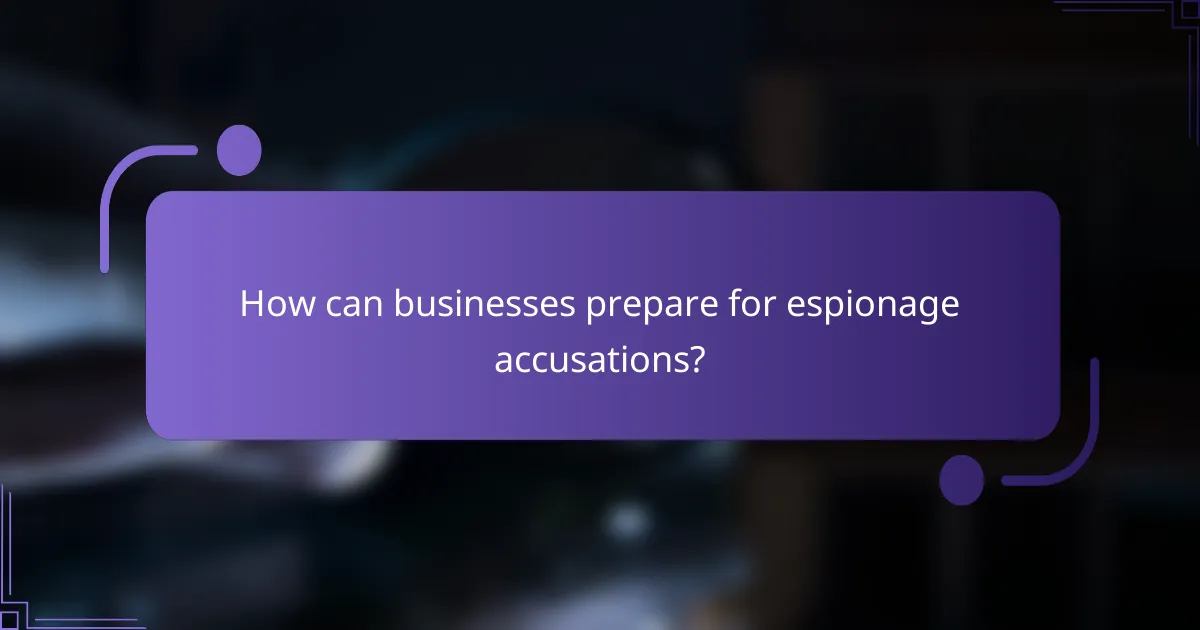
How can businesses prepare for espionage accusations?
Businesses can prepare for espionage accusations by establishing robust compliance programs, training employees on security protocols, and creating effective reporting mechanisms. These proactive measures help mitigate risks and ensure that the organization is ready to respond appropriately to any allegations.
Implementing compliance programs
Compliance programs are essential for businesses to adhere to legal standards and protect sensitive information. Companies should develop policies that outline acceptable practices regarding data handling and confidentiality. Regular audits can help ensure these policies are being followed and identify any potential vulnerabilities.
Consider integrating industry best practices and relevant regulations into your compliance framework. For example, aligning with standards such as ISO 27001 can enhance your organization’s security posture and demonstrate a commitment to safeguarding information.
Conducting employee training
Employee training is crucial for preventing espionage incidents. Regular training sessions should cover topics such as data protection, recognizing suspicious behavior, and understanding the consequences of espionage. This education empowers employees to act as the first line of defense against potential threats.
Utilize a mix of training methods, including workshops, online courses, and simulations. Assessing employee understanding through quizzes or practical scenarios can reinforce key concepts and ensure that staff are well-prepared to handle sensitive information securely.
Establishing reporting mechanisms
Effective reporting mechanisms allow employees to report suspicious activities without fear of retaliation. Establishing anonymous reporting channels, such as hotlines or online forms, encourages staff to communicate concerns promptly. This transparency can help identify potential espionage threats early on.
Regularly review and update these mechanisms to ensure they remain effective and accessible. Providing feedback on reported issues can also foster a culture of openness and vigilance within the organization, making it easier to address potential espionage risks proactively.
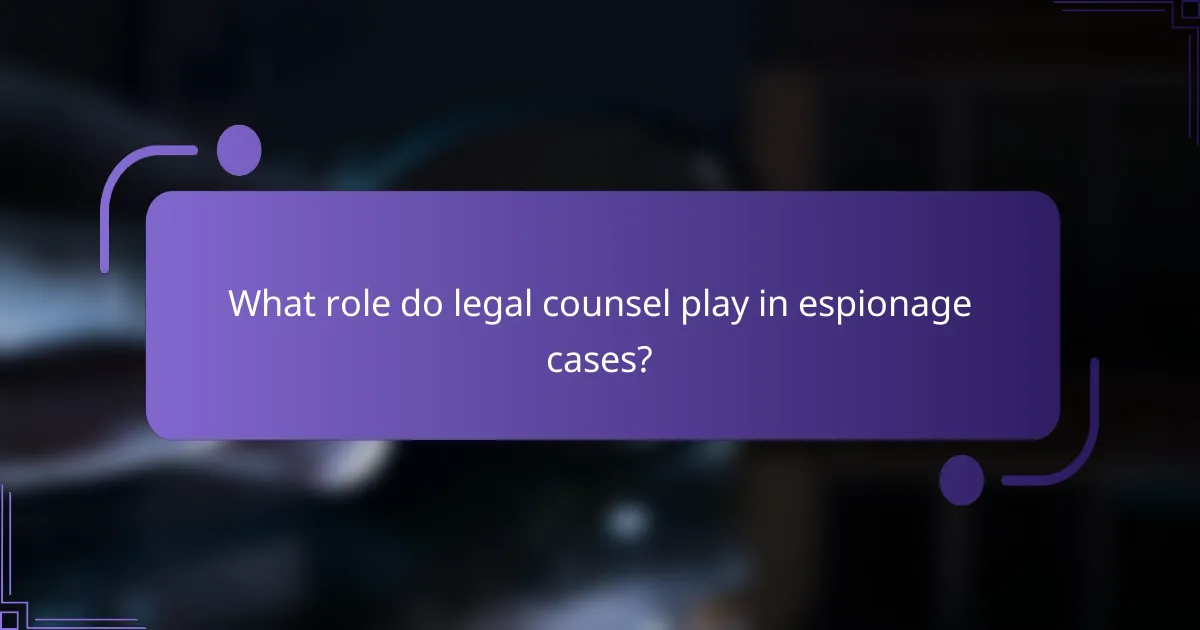
What role do legal counsel play in espionage cases?
Legal counsel play a crucial role in espionage cases by providing guidance on legal rights, strategies, and representation. Their expertise helps businesses navigate the complexities of accusations and potential legal repercussions.
Advising on legal strategy
Legal counsel assists businesses in formulating a robust legal strategy when facing espionage allegations. This involves assessing the evidence, understanding applicable laws, and identifying potential defenses. Counsel may recommend actions such as conducting internal investigations or gathering evidence to support the business’s position.
It’s essential for businesses to remain proactive and consult with legal experts early in the process. This can help mitigate risks and prepare for possible litigation or regulatory scrutiny.
Representing in court
In the event of a trial, legal counsel represents the business in court, advocating for its interests. They present evidence, cross-examine witnesses, and argue legal points to defend against espionage charges. Effective representation can significantly influence the outcome of the case.
Choosing an attorney with experience in espionage cases is critical, as they will be familiar with the nuances of relevant laws and courtroom procedures. This expertise can make a substantial difference in how the case unfolds.
Negotiating settlements
Legal counsel also plays a key role in negotiating settlements to resolve espionage allegations outside of court. They assess the strengths and weaknesses of the case and advise on the feasibility of settlement options. This can save time and resources for the business.
During negotiations, counsel can help determine appropriate compensation or terms that align with the business’s interests. Understanding the potential costs of litigation versus settlement can guide these discussions effectively.
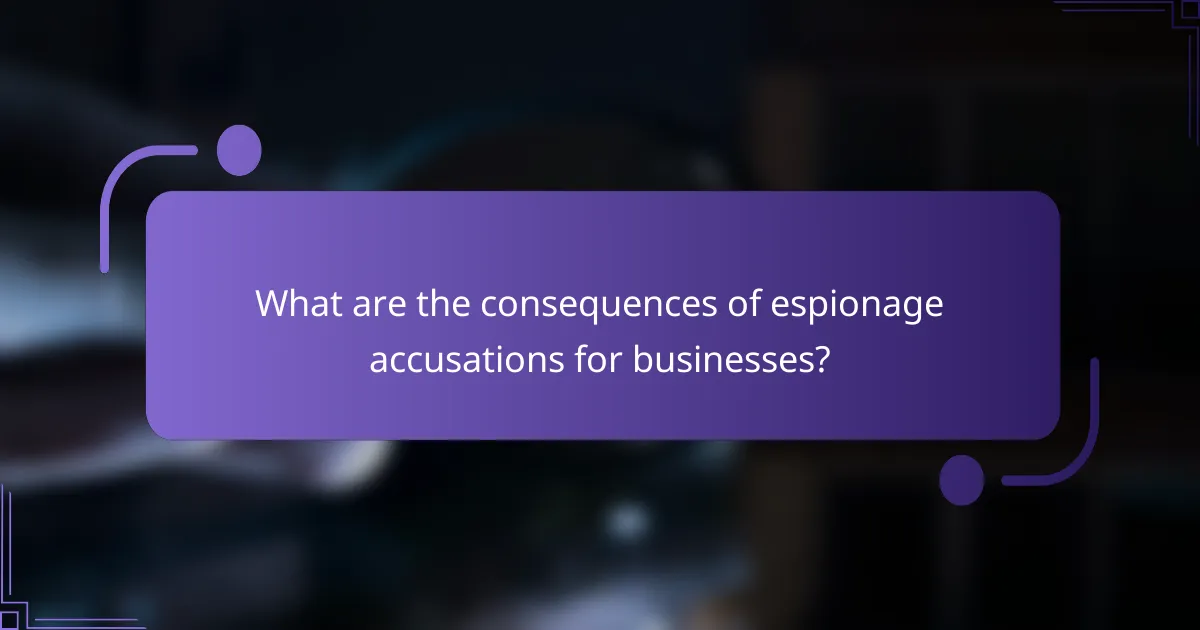
What are the consequences of espionage accusations for businesses?
Espionage accusations can lead to severe repercussions for businesses, impacting their reputation, finances, and operations. Companies may face long-term damage to their credibility, significant financial costs, and interruptions in their day-to-day activities.
Reputational damage
Accusations of espionage can severely tarnish a company’s reputation, leading to loss of customer trust and loyalty. Negative media coverage can amplify public perception issues, making it difficult for the business to recover its standing in the market.
To mitigate reputational damage, businesses should engage in transparent communication and public relations strategies. Proactively addressing the allegations and demonstrating commitment to ethical practices can help restore confidence among stakeholders.
Financial penalties
Businesses accused of espionage may face hefty financial penalties, including fines imposed by regulatory bodies or legal settlements. These costs can range from thousands to millions of dollars, depending on the severity of the allegations and the jurisdiction involved.
Companies should prepare for potential financial repercussions by maintaining comprehensive insurance policies that cover legal expenses and fines. Regular audits and compliance training can also help minimize risks associated with espionage claims.
Operational disruptions
Espionage accusations can lead to significant operational disruptions, including investigations that divert resources and attention from core business activities. This can result in delays in product development, loss of key personnel, and challenges in maintaining customer service levels.
To reduce operational impacts, businesses should establish crisis management plans that outline steps to take in the event of an espionage accusation. This includes designating a response team, ensuring clear communication channels, and maintaining continuity plans to keep operations running smoothly.
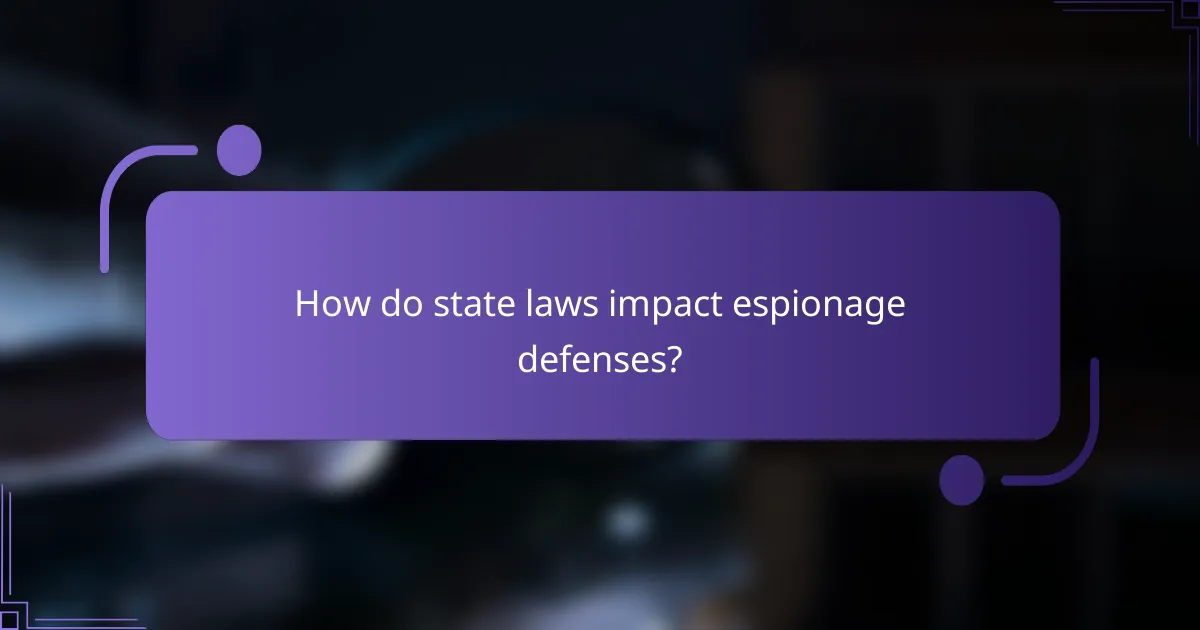
How do state laws impact espionage defenses?
State laws significantly influence the legal defenses available to businesses accused of espionage. Variations in statutes and legal precedents across states can affect the outcome of cases and the strategies employed by defendants.
Variations in state statutes
Different states have distinct statutes regarding espionage, which can include varying definitions of what constitutes espionage and the penalties involved. For example, some states may classify corporate espionage as a felony, while others might treat it as a misdemeanor, impacting the severity of potential consequences.
Businesses must be aware of their specific state laws to effectively navigate accusations. Consulting with legal experts familiar with local statutes can help in understanding the nuances that may affect a defense strategy.
State-specific legal precedents
Legal precedents set by state courts can shape how espionage cases are interpreted and prosecuted. For instance, a ruling in one state may establish a precedent that influences future cases, potentially affecting the defenses available to businesses facing similar accusations.
Understanding these precedents is crucial for formulating a defense. Legal counsel should review past cases in the relevant jurisdiction to identify successful defense strategies and potential pitfalls that may arise based on historical outcomes.
